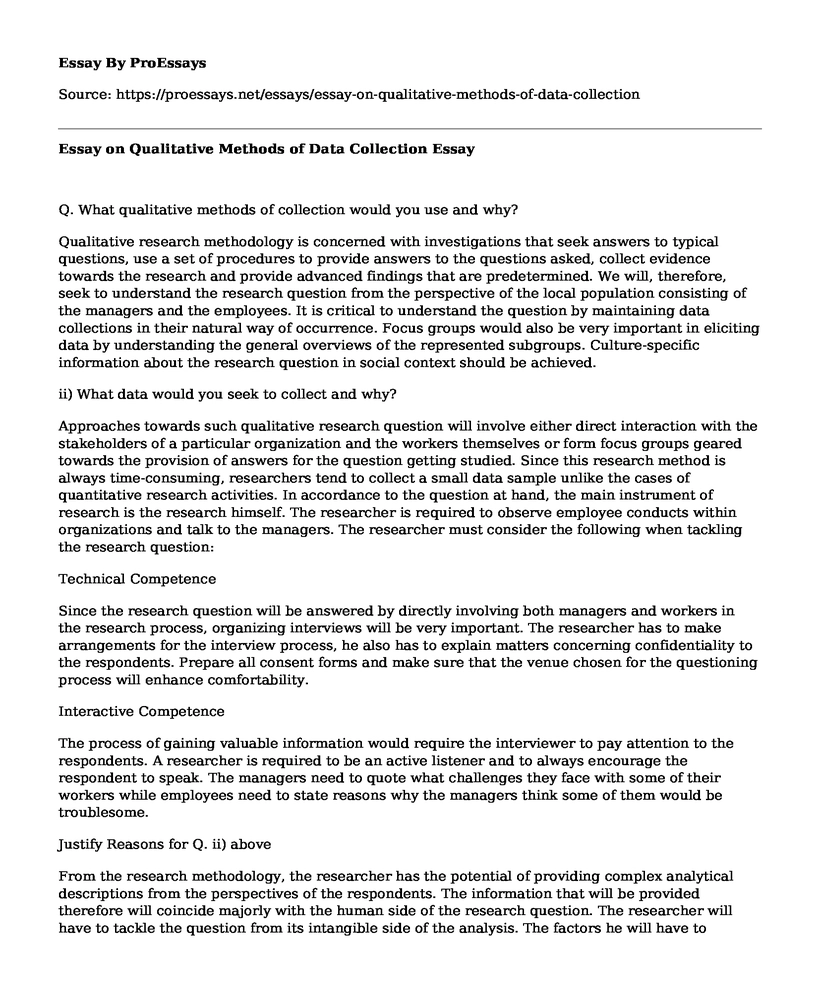Q. What qualitative methods of collection would you use and why?
Qualitative research methodology is concerned with investigations that seek answers to typical questions, use a set of procedures to provide answers to the questions asked, collect evidence towards the research and provide advanced findings that are predetermined. We will, therefore, seek to understand the research question from the perspective of the local population consisting of the managers and the employees. It is critical to understand the question by maintaining data collections in their natural way of occurrence. Focus groups would also be very important in eliciting data by understanding the general overviews of the represented subgroups. Culture-specific information about the research question in social context should be achieved.
ii) What data would you seek to collect and why?
Approaches towards such qualitative research question will involve either direct interaction with the stakeholders of a particular organization and the workers themselves or form focus groups geared towards the provision of answers for the question getting studied. Since this research method is always time-consuming, researchers tend to collect a small data sample unlike the cases of quantitative research activities. In accordance to the question at hand, the main instrument of research is the research himself. The researcher is required to observe employee conducts within organizations and talk to the managers. The researcher must consider the following when tackling the research question:
Technical Competence
Since the research question will be answered by directly involving both managers and workers in the research process, organizing interviews will be very important. The researcher has to make arrangements for the interview process, he also has to explain matters concerning confidentiality to the respondents. Prepare all consent forms and make sure that the venue chosen for the questioning process will enhance comfortability.
Interactive Competence
The process of gaining valuable information would require the interviewer to pay attention to the respondents. A researcher is required to be an active listener and to always encourage the respondent to speak. The managers need to quote what challenges they face with some of their workers while employees need to state reasons why the managers think some of them would be troublesome.
Justify Reasons for Q. ii) above
From the research methodology, the researcher has the potential of providing complex analytical descriptions from the perspectives of the respondents. The information that will be provided therefore will coincide majorly with the human side of the research question. The researcher will have to tackle the question from its intangible side of the analysis. The factors he will have to consider include the respondent whose role in the research question is not apparent and in this case, it is the employee, socioeconomic effect of the research question and the social norms influenced by the question.
Data Collection
The types of data required in this case are interview notes and sample, audio or video recordings and transcripts. From the available information, the variations within the study question can be determined, the relationship between managers to the study question and the employees to the same question can be determined as well and lastly, individual experiences of the researcher can be determined. The data collected should generally be able to:
Explore the possibilities of finding answers to the research question
Instrumental in eliciting flexibility and portray the ability of the researcher to use iterative styles of collection plus categorization of responses to the research question.
Importance of Sampling
Since our qualitative method of data collection will not require data from a large number of respondents, the sample information provided will be very helpful. Since data review and analysis will be carried out in conjunction with collection processes, purposive sampling technique will be very useful.
Q2. Semantics of qualitative to quantitative research methodologies
The fundamental principles of ethical research will require that researchers respect the responses of the respondents at any given point of the research process. By adhering to the principles of research ethics, participants will not be used as toys for fulfilling research objectives but as autonomous subjects of fact finding. Through beneficence, risks associated with the research process are reduced. On the contrary, benefits that come with this methodology are maximized. The process will also ensure that a number of risks are fairly distributed between the researcher and the respondents. Bioethics ensures that there is respect to communities. This involves the obligation of the researcher to protect the community in which the research is conducted from any form of harm.
Generally, it should be noted that activities involving data collection would require more than just a formal interaction between the researcher and the research respondent. In-depth data collection processes will, therefore, determine the quality of data collected. The researcher must understand the purpose of the research, he must also know what is expected of the respondents and explain the risks and benefits of the research. Other issues to be understood by the researcher include:
Participation is voluntary and the participants have the capability withdraw from the process in whatever occasion they deem fit.
Confidentiality of the respondents should also be much protected.
Reference
Retrieved February 12, 2017, from http://www.ccs.neu.edu/course/is4800sp12/resources/qualmethods.pdfLearning, I. of L. (2009, November 12). 3. Methods of collecting qualitative data. Retrieved February 12, 2017, from http://libweb.surrey.ac.uk/library/skills/Introduction%20to%20Research%20and%20Managing%20Information%20Leicester/page_54.html
Cite this page
Essay on Qualitative Methods of Data Collection. (2021, Apr 06). Retrieved from https://proessays.net/essays/essay-on-qualitative-methods-of-data-collection
If you are the original author of this essay and no longer wish to have it published on the ProEssays website, please click below to request its removal:
- The Shell Company SWOT Analysis
- Black African Parents Experiences of an Educational Psychology Service
- My Life in College - Essay Sample
- Writing and Evaluating Test Items Paper Example
- Scholarship for Environmental Economics Student Application Letter
- Paper Example on Uprooting White Supremacy Culture: Ensuring Racial Equity in Schools
- Infant Brain Dev: Extrinsic & Intrinsic Factors Impact Learn & Growth - Essay Sample







